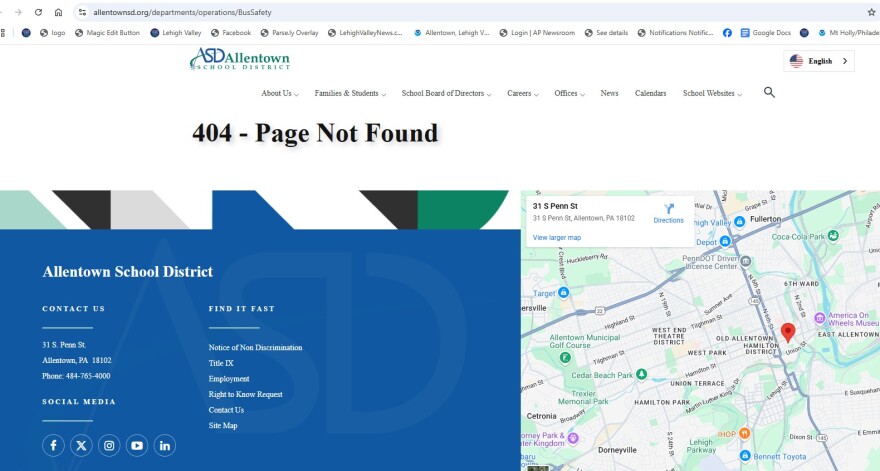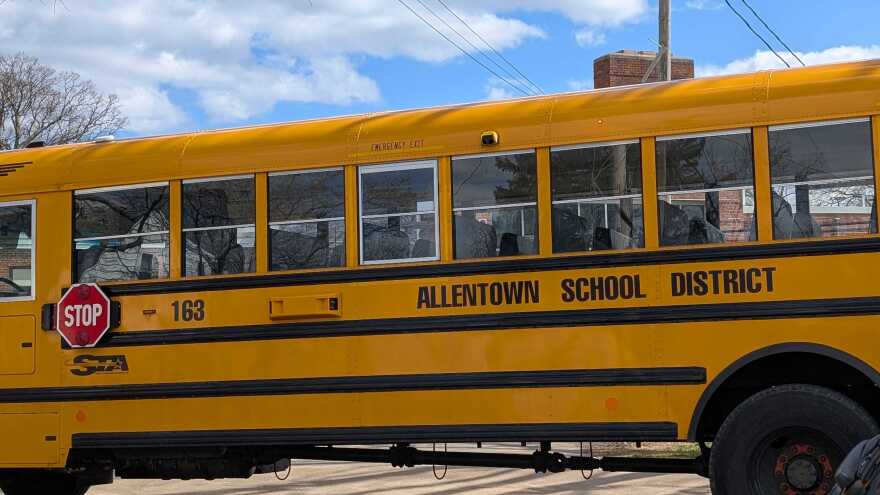ALLENTOWN, Pa. — The state Office of Open Records has ordered the Allentown Police Department to release records connected to the BusPatrol school bus safety program that yielded more than 3,000 motorist citations in the first three months of this year.
The state agency issued the order after LehighValleyNews.com appealed Allentown's denial of a request for records under the state's Right to Know law.
Among the records sought were:
- The number of BusPatrol fines appealed for each year the program has been active
- The number of BusPatrol fines paid and unpaid
- The number of appeals to a PennDOT hearing officer
- The number of appeals to a district magistrate
- The number of appeals upheld and the number of appeals rejected
- The amount of total funds received by the Allentown Police Department
The city initially denied the request, claiming the records were “highly confidential and proprietary” and thus exempt from disclosure. It later released limited information, stating it did not possess nor control all of the requested documents.
But appeals officer Daneen L. Miller-Smith found otherwise, ruling that “the evidence demonstrates that responsive records exist in BusPatrol’s possession, and the City has constructive access to those records.”
"Anytime an agency’s denial is broad, it raises a red flag — especially if the requested records involve public money, which are the most public of public records.”Melissa Melewsky, Media Law Counsel for the Pennsylvania NewsMedia Association
Melissa Melewsky, media law counsel for the Pennsylvania NewsMedia Association, said the ruling underscores a foundational element of the Right-to-Know Law: access to information involving public money.
“The Right-to-Know Law is remedial legislation intended to increase public access and accountability,” Melewsky said.
“The courts have recognized this fundamental principle by requiring agencies to apply the RTKL exemptions narrowly and in favor of public access. Thus, anytime an agency’s denial is broad, it raises a red flag — especially if the requested records involve public money, which are the most public of public records.”
Allentown now has 30 days to comply with the ruling or challenge it in Lehigh County Court.
How automated citations work
Under Pennsylvania law, drivers who illegally pass a school bus with its red lights flashing and stop arm extended can be fined $300 through a civil citation.
The enforcement is automated. Cameras installed on about 35,000 buses across 20 states — including 6,000 in Pennsylvania — capture footage of alleged violations.
Of the $300 fine per citation, $250 goes to the school district, $25 to the issuing police department, and $25 to the state’s School Bus Safety Grant Program.
In Allentown, 139 school buses were equipped with BusPatrol cameras during the 2024-25 school year. Local police departments review the video evidence and determine whether to issue a citation, which must be mailed to the vehicle’s registered owner within 30 days.
LehighValleyNews.com began investigating Allentown’s use of the system in early April, after learning the city had issued at least 3,151 citations since the start of the year — an average of 56.2 per weekday.
That rate outpaces even larger cities like Pittsburgh, which averaged 38.6 weekday citations over a recent nine-month stretch.
“Understanding how public money is collected and spent by government is a critical tool for the public’s ability to understand government decisions and for holding public officials accountable.”Melissa Melewsky, Media Law Counsel for the Pennsylvania NewsMedia Association
Melewsky said this kind of data is exactly what the Right-to-Know Law was meant to uncover.
“The law recognizes that the public has a significant interest in knowing how public funds are collected and doled out, which makes the denial in this case both unnecessary and inappropriate,” she said.
“Understanding how public money is collected and spent by government is a critical tool for the public’s ability to understand government decisions and for holding public officials accountable.”
System delays and transparency concerns
Further reporting revealed the program has been bogged down by delays. An analysis last month by LehighValleyNews.com found that more than 1,000 appeals of Lehigh Valley BusPatrol citations filed in 2025 had yet to be heard — due to backlogs from 2024 and a limited number of available hearing officers, according to PennDOT.
A 2023 change in state law shifted the appeal process for these violations away from local magistrates to PennDOT-appointed hearing officers.
It also mandated new transparency measures, requiring all participating school entities to submit annual data to PennDOT and Pennsylvania State Police by July 1. A public report based on that data must include:
- Number of violation notices issued
- Fines assessed and collected
- Payments under authorized agreements
- Results of contested cases
- Use of revenue and grant funding from the program
The report is required to be posted to the schools’ publicly available website by Dec. 31 each year.

A link to the Allentown School District website from the state's 2023 Annual Report redirects to a '404 Page Not Found,' and no part of the site appears to address the district's current contract with BusPatrol or outline automated enforcement efforts.
Links to other school websites using automated school bus enforcement also were found to be broken or inaccessible, while some districts, including Pittsburgh Public Schools, have issued program report cards that include all required data.
Melewsky said the public deserves to know whether the program is meeting its intended goals.
“The records in this case allow the public to understand how the new school bus statute is being used by agencies and whether that use is consistent with the goals of the law and the public interest,” she said.
“Access to records about the law’s application and administration are necessary to determine if the law is working or needs to be amended. That is simply not possible without access to the records.”
School district also denies request
LehighValleyNews.com also submitted two separate records requests to the Allentown School District, seeking a copy of its contract with BusPatrol and records detailing annual program revenue. The district denied the revenue request and provided only a redacted version of the contract.
LehighValleyNews.com on Friday appealed both of those responses to the Office of Open Records as well, including the school district’s partial denial of the contract request.
The news outlet argued the redactions make it impossible to know what's been withheld and why, including how much public money the school district is paying BusPatrol or sharing in ticket revenue.
The Office of Open Records will make a determination on both appeals.
Melewsky emphasized that while newsrooms have the resources to challenge such denials, not all Pennsylvanians do.
“Your news organization is aware of the law and has legal assistance in challenging the denial,” she said, “but many citizens who are similarly denied would not have those resources and, as a result, could give up rather than pursue an adversarial legal process against government-funded attorneys.
"Agencies must be very careful to only deny access when the law requires it — especially when the request seeks information about public money," she said.


